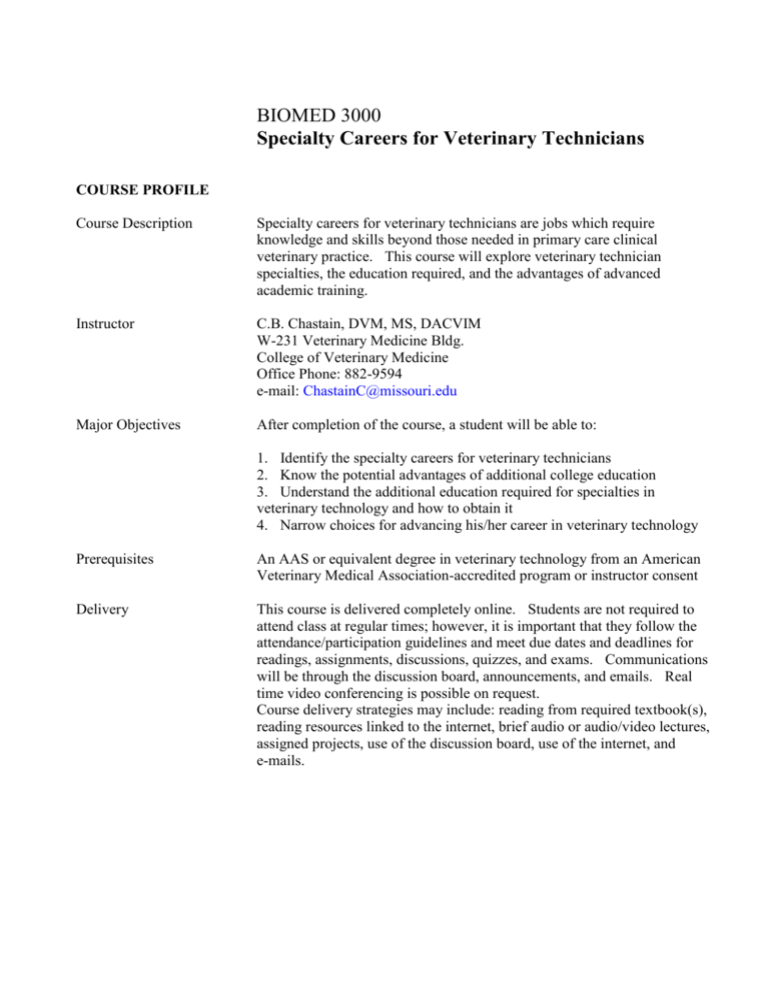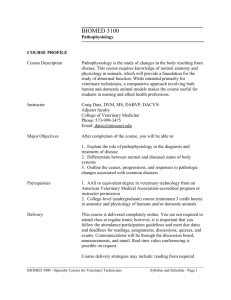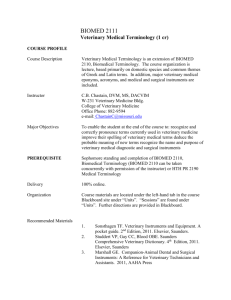example syllabus - MU Biomed Online
advertisement

BIOMED 3000 Specialty Careers for Veterinary Technicians COURSE PROFILE Course Description Specialty careers for veterinary technicians are jobs which require knowledge and skills beyond those needed in primary care clinical veterinary practice. This course will explore veterinary technician specialties, the education required, and the advantages of advanced academic training. Instructor C.B. Chastain, DVM, MS, DACVIM W-231 Veterinary Medicine Bldg. College of Veterinary Medicine Office Phone: 882-9594 e-mail: ChastainC@missouri.edu Major Objectives After completion of the course, a student will be able to: 1. Identify the specialty careers for veterinary technicians 2. Know the potential advantages of additional college education 3. Understand the additional education required for specialties in veterinary technology and how to obtain it 4. Narrow choices for advancing his/her career in veterinary technology Prerequisites An AAS or equivalent degree in veterinary technology from an American Veterinary Medical Association-accredited program or instructor consent Delivery This course is delivered completely online. Students are not required to attend class at regular times; however, it is important that they follow the attendance/participation guidelines and meet due dates and deadlines for readings, assignments, discussions, quizzes, and exams. Communications will be through the discussion board, announcements, and emails. Real time video conferencing is possible on request. Course delivery strategies may include: reading from required textbook(s), reading resources linked to the internet, brief audio or audio/video lectures, assigned projects, use of the discussion board, use of the internet, and e-mails. Organization Course materials are located under the left-hand tab in the course Blackboard site under “Units”. “Sessions” are found under “Units” and “Modules” under “Sessions”. Further directions are provided in Blackboard. Required Materials Rose R, Smith CA. Career Choices for Veterinary Technicians. AAHA Press. 2009 EVALUATION OF STUDENT PERFORMANCE Satisfactory Performance Exams and Quizzes Scoring of Assignments Grading There will be 1000 possible points. A portion of the possible points will be achieved each week. More than 600 is required for a passing grade. Two proctored exams will provide a total of 600 points. The remaining 400 will be based on weekly quiz scores, professionalism (attendance, meeting deadlines), and contributing to required course journals. The instructor reserves the authority to adjust final grades if no student achieves 100% of possible points in the course. Students with less than 61% at mid-term will receive a warning. Grades will be available in Blackboard. To insure confidentiality, they will not be sent by e-mail. Students must log on to the course at least twice each week to receive professionalism points. Students who perform well typically log on 3 or more times per week. Exams are available only under the supervision of a proctor. Contact Mizzou Online to locate a local proctor for your exams. Fifty minutes will be allowed for exams. Quizzes are not proctored, but you are expected to complete the quizzes by yourself. Each quiz is timed so that you will not have time to rely on reference materials, i.e. they are not open-book quizzes. If you take more time than the quiz or exam allows, your score will be deducted the points of one question each minute in overtime. You may take a quiz or exam only once. You must complete the exam or quiz once you start it. You may NOT come back to the quiz later. If you are disconnected during an exam, contact the instructor immediately and then send an e-mail to blackboard@missouri.edu with your name, username, course name, title of the quiz or exam, and a description of the problem. Click “Submit” after you have reviewed your answers to have the quiz or exam graded. In addition to exams and quizzes, students will be scored on course participation by submitting blogs and answering discussion questions. Blogs and discussion questions will be scored on thoughtful content, appropriate length, grammar, and spelling. The grading scale will be A to F, including some pluses and minuses but no A+, C+, C-, D+, or D-. Grades will be based on the following scale: 96-100% = A 91-95% = A88-90% = B+ 84-87% = B 81-83% = B71-80% = C 61-70% = D 60% or less = F Note: A Certificate in Biomedical Technology requires at least a “C” grade in this course, plus a total of 15 cr hr BIOMED courses with an average GPA in all BIOMED courses of 3.0. COURSE SCHEDULE Unit Date Unit/Session 1: Benefits of Education Beyond the AAS 1: Secrets of Success 2: Self-Assessment 2: Teaching and Management 3: Teaching 4: Management 3: Industry and Organization 5. Industrial Veterinary Technology 6: Associations and Organizations 4: Government and Exam #1 7: Government 8. Proctored EXAM #1 Reading Assignments Other Assignments Ch. 1 Ch. 2 Discussion Board, Blog, and Quiz Ch. 7 Ch. 8 Blog and Quiz Ch. 12 Ch. 13 Blog and Quiz Blog Ch. 15 --- 5: Clinical Specialties 1 Web sites 9: Dentistry Web sites 10: Anesthesiology 6: Clinical Specialties II Web sites 11: Internal Web sites Medicine; Nutrition 12: Emergency and Critical Care; Clinical Practice 11/14-12-4 (11/19-11/27 is vacation) 7: Clinical Specialties III Web sites 13: Animal Web sites Behavior; Zoological Medicine 14: Equine Nursing; Surgery 12/5-12/10 8: The Future and Blog and Quiz Blog and Quiz Blog and Quiz







